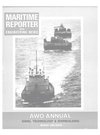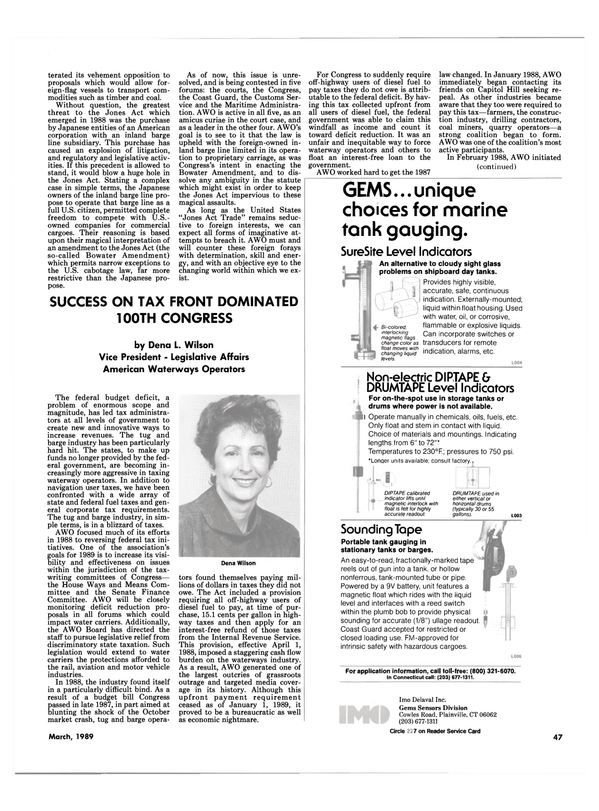
SUCCESS O N TAX FRONT DOMINATED 100TH CONGRESS
The federal budget deficit, a problem of enormous scope and magnitude, has led tax administrators at all levels of government to create new and innovative ways to increase revenues. The tug and barge industry has been particularly hard hit. The states, to make up funds no longer provided by the federal government, are becoming increasingly more aggressive in taxing waterway operators. In addition to navigation user taxes, we have been confronted with a wide array of state and federal fuel taxes and general corporate tax requirements.
The tug and barge industry, in simple terms, is in a blizzard of taxes.
AWO focused much of its efforts in 1988 to reversing federal tax initiatives.
One of the association's goals for 1989 is to increase its visibility and effectiveness on issues within the jurisdiction of the taxwriting committees of Congress— the House Ways and Means Committee and the Senate Finance Committee. AWO will be closely monitoring deficit reduction proposals in all forums which could impact water carriers. Additionally, the AWO Board has directed the staff to pursue legislative relief from discriminatory state taxation. Such legislation would extend to water carriers the protections afforded to the rail, aviation and motor vehicle industries.
In 1988, the industry found itself in a particularly difficult bind. As a result of a budget bill Congress passed in late 1987, in part aimed at blunting the shock of the October market crash, tug and barge opera- tors found themselves paying millions of dollars in taxes they did not owe. The Act included a provision requiring all off-highway users of diesel fuel to pay, at time of purchase, 15.1 cents per gallon in highway taxes and then apply for an interest-free refund of those taxes from the Internal Revenue Service.
This provision, effective April 1, 1988, imposed a staggering cash flow burden on the waterways industry.
As a result, AWO generated one of the largest outcries of grassroots outrage and targeted media coverage in its history. Although this upfront payment requirement ceased as of January 1, 1989, it proved to be a bureaucratic as well as economic nightmare.
Read SUCCESS O N TAX FRONT DOMINATED 100TH CONGRESS in Pdf, Flash or Html5 edition of March 1989 Maritime Reporter
Other stories from March 1989 issue
Content
- HBC Barge Acquired By Trinity Industries page: 5
- Marine Interiors Offers Free Literature Listing Products And Services page: 6
- M a r i t i m e London 8 9 To Be Held April 17-21 In City Of London page: 6
- Swagelok Quick-Connects With Heavy-Duty Body Sleeve Now Available page: 8
- Palmer Offers Brochure On Cavitation-Reducing Polymer Coatings page: 8
- T w i n Disc Expands M a r i n e Transmission Series For Workboat Applications page: 9
- Soundcoat Offers Brochure On Vibration-Dissipating Noise Reduction Material page: 9
- N a u t i C a n Enterprises Reports Advanced Propeller Nozzle Improves Thrust, Lowers Drag page: 10
- Gladding-Hearn Announces Sale Of 3rd High-Speed Ferry For Great Lakes page: 10
- Avondale Boat Division Building 400-Passenger SES Ferry page: 11
- Lykes Names Two Senior VPs And Three New VPs page: 11
- Navigation & Communications Equipment Review page: 12
- N A V Y — A $35-BILLION ANNUAL MARKET page: 25
- MAJOR NAVY CONTRACTS page: 27
- ASNE-Mechanicsburg Section To Host Annual N a v a l Logistics Symposium In Carlisle, Pa., O n March 7 -9 page: 30
- Newest Navy Crane Ship Christened 'Diamond State' At Tampa Shipyards page: 31
- Southwest M a r i n e Drydocks Two N a v y Vessels Simultaneously For Extensive Repair Work page: 34
- Portland Ship Repair Yard Posts Successful Year page: 34
- Eldec Corporation And Dunlop Limited Form Joint Venture Company page: 34
- Dampa Appoints Hopeman Brothers Sole U.S. Distributor page: 35
- Compass Display Protected From Abrasion By Coating page: 36
- ABS Forms Corporate Quality Assurance Group page: 36
- Imperial Immersion Suits Save Lives; Survivors Get Club Membership page: 36
- SSE Launches New Class Corvette For Singapore Navy page: 38
- L&C Associates Offers Brochure On Marine Dehumidification Service page: 38
- Rolla's New Five-Bladed REXP5 Propeller Represents Breakthrough In Design page: 38
- Cargocaire Introduces Marine Dehumidifier page: 39
- Marinette Marine Tests MCM-2 Propulsion Plant page: 40
- New Generator Line From Marathon Electric page: 40
- Pan American Hovercraft Offers Color Brochure On New Design Hovercraft page: 43
- VPSI Completes Crankshaft Contract page: 43
- A W O Acclaimed For Quick, Decisive Action To Combat Drought Effects page: 44
- CABOTAGE: I N THE INTEREST OF N A T I O N A L DEFENSE A ND COMMERCE page: 46
- SUCCESS O N TAX FRONT DOMINATED 100TH CONGRESS page: 47
- W O R K I N G TOWARD CLEAN AIR A ND CLEAN WATER page: 49
- Muller Appointed Assistant VP-Operations At Moran Towing page: 51
- A W O Annual M e e t i n g To Be Held In Washington, D.C. April 6 -7 page: 51
- Literature Available On Circle Seal's Plastic Inline Check/Relief Valves page: 51
- New Commuting Service Begins Between New Jersey And New York page: 51
- New Engine Analyzer Reduces Fuel Costs On Marine Diesels page: 52
- American United Marine Wins Achievement Award For TFC Compactor Sales page: 52
- First U.S. Commercial SWATH To ABS Class Under Construction page: 53
- Unitor Ship's Hospital, Safety And Maintenance Equipment Chosen For 'Royal Viking Sun' page: 53
- Aluminum Boats Delivers 150-Passenger Excursion Boat To Maryland Tours page: 63
- Alfa Products Introduces New Boat Bilge Cleaner —Literature Available page: 63


